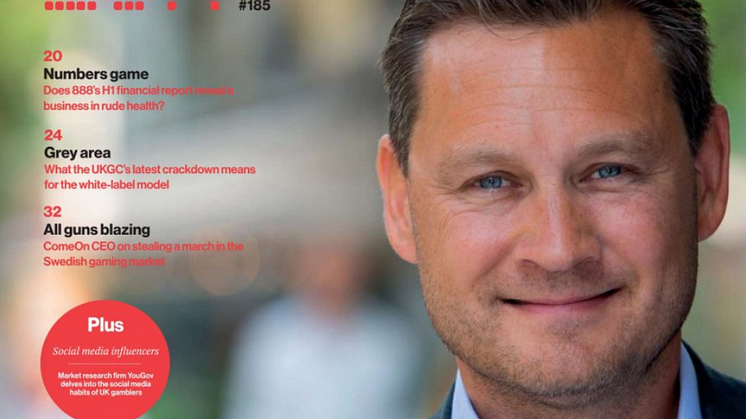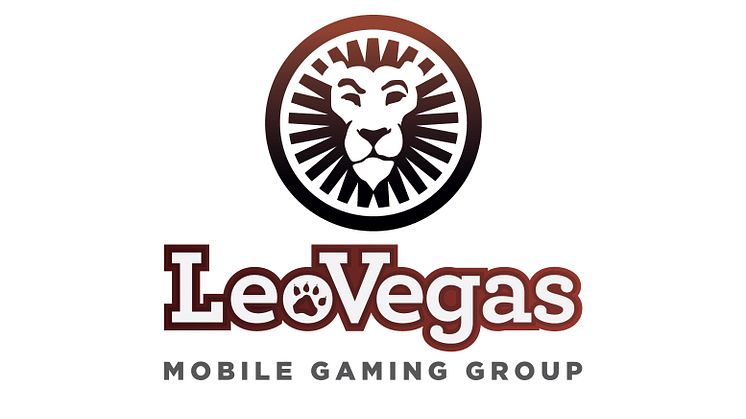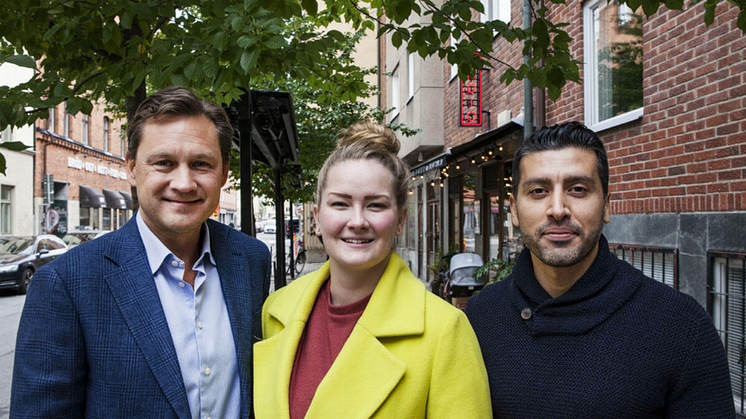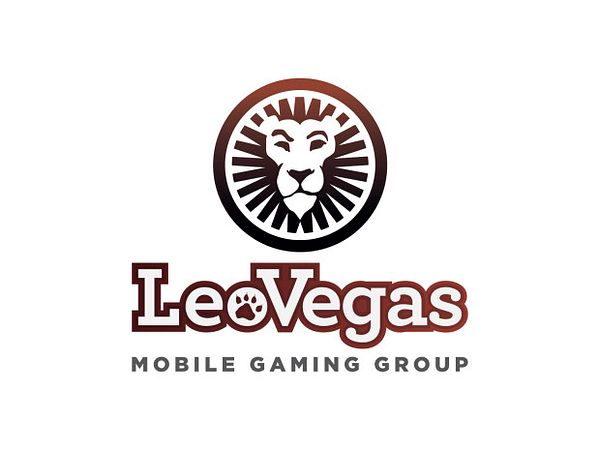
Nyhet -
Ready to roar - on the rise
Following a challenging 2018, Brad Allen at EGR Intel talks to Group CEO of LeoVegas, Gustaf Hagman, about the firm’s bouncebak, its success in Sweden and developments in product innovation.
Cover feature presented in EGR Intel #185, 2019-09-30. By Brad Allen.
How LeoVegas bounced back from its “most challenging” year ever
The story of LeoVegas is in many ways the story of the online gambling industry. The firm exploded onto the scene in the early 2010s with its focus on mobile working in perfect harmony with the explosion of smartphone usage. It quickly listed in 2016, just four years after launch, buoyed by 2015 revenues of €83m, and enjoyed a serene journey into life as a public company with strong growth and chunky profits. Until 2017 that is, when gambling regulators decided to take a closer look under the bonnet of the companies they were meant to be regulating.
Many firms had to get to grips with its customers and ultimately also close thousands of VIP accounts, with LeoVegas shutting accounts. CEO Gustaf Hagman subsequently described 2018 as the most “challenging” year in the firm’s history.
“We bumped into challenges that we have not previously encountered and saw a slowdown in growth as a result,” Hagman said. Most execs around the industry could relate. The challenge for the firm now, as it is for many others, is to rebuild in a brave new world with lower customer lifetime values, spiralling compliance costs and growing scrutiny from regulators and the media alike.
Ready for regulated markets
In regulated markets, the way forward for most consumer products seems to be simplicity and speed. Essentially just making it as easy as possible for a consumer to do what they are trying to do. LeoVegas was initially a little behind the curve when the original PayNPlay no-registration concept took the Nordics by storm, but Leo has righted those wrongs and now earns plaudits for the simplicity of its sign-up.
“They have a very easy-to-use website in Sweden and I think they probably have the easiest log-in, deposit and so on,” says Hjalmar Ahlberg, an analyst covering LeoVegas at Kepler Cheuvreux. “They have their own platform and move quickest on new products and concepts.”
In fact, when asked about the company’s ongoing success in Sweden (more on that later), Hagman points to the agility of the management team he has built. “I think it’s important to have a skilled management team of people that are fast moving and can change their mind quite quickly. When things are happening in certain markets, my teams have an entrepreneurial mindset and are quick to adjust.”
The latest tax data from Sweden appears to show a company on the rise, with Swedish revenues hitting around £6.5m in August for LeoVegas, up from around £3.9m in January when the market first launched. Hagman attributes the uptick to the strength of the Leo brand, experience in operating in regulated markets, and PPC expertise shipped in from the group’s UK arm. “When Google and Facebook opened up here, we sent a digital marketing SWAT team to Sweden, which has helped out a lot,” Hagman says.
_______________________________________________________________________
“I think it’s important to have a skilled management team of people that are fast moving and can change their mind quite quickly.
Gustaf Hagman, LeoVegas.
_______________________________________________________________________
Product innovation too has been a focus for the Malta-headquartered firm. Back in April, the operator unveiled new gamification tools including real-time tournaments and achievements based on player data. The tools are powered by CompetitionLabs, which generates tournaments, missions, achievements and insights across LeoVegas casino brands.
The operator has also launched a split-screen gaming innovation that lets punters play multiple casino games on the same mobile screen simultaneously. LeoVegas named its feature LeoVegas Multiplay, with Hagman hailing it as the “next stage in the evolution of mobile casino”. That might be a little overselling it given some concerns about responsible gaming, and the very nature of innovation is that not every idea will stick. But the right concept can boost retention and be a valuable acquisition tool – particularly in an industry where differentiation is increasingly difficult to come by.
Playing the long game
Is it possible then that, despite all the hand wringing from Sweden-facing firms in H1 about the negative impact of re-regulation, larger companies will ultimately benefit? Indeed, the same tax figures show the bigger firms in general hoovering up share, and smaller companies beginning to struggle with the burden of regulation. Would Leo look to speed that process up artificially, perhaps by acquiring some of the smaller brands and their player databases at bargain basement prices?
A resounding “no” from Hagman: “We’re not interested in that,” he says. “Simple as that. And the reason is that we already have a majority of those customers in our database and we don’t know how they have been treating their customers. It’s fairly easy for us to just continue to grow and eat the smaller ones that way.”
The bigger threat to growth in Sweden is the black market, where a lot of the smaller firms will end up when the burden of regulation becomes too much to bear. Despite the Swedish Gambling Authority claiming a 91% channelisation rate, most actually participating in the market suggest the real figure, especially for sportsbook and casino, is much lower. Some parts of the gaming sector in Sweden (like horse betting pools operated by former monopoly operator ATG) likely has a 100% channelisation rate and if the 91% figure is accurate for the total, then that means sportsbook and casino is much lower than 91%.

Mandalorian Technologies chairman Mikael Pawlo said in a recent EGR op-ed the figure for casino was perhaps as low as 70%, while Hero Gaming CEO Tomas Bäckman said at the Betting on Sports conference last month that channelisation might be as low as 65%.
The Swedish regulator is slowly tackling the problem, recently writing to payment processors warning them against partnering with unlicensed operators. Swedish providers too recently cut links with black market firms.
“Hopefully, the payment providers will start to understand that they’re not driving a sustainable business by transferring money to unlicensed casinos,” Hagman says. “And hopefully, some of the game providers and affiliates will actually start to understand that if you are in a licensed market, then you need to adhere to the rules within it.”
Competing for eyeballs
Returning to the original question though, how do you keep delivering growth and profits under the new model of online casino with lower player values? One way forward is shown by 888, a company which several analysts referenced to as a decent analogue for Leo, with its online casino focus.
888 has returned its UK casino vertical to growth through a recreational focus with its Orbit platform, which aims for a Netflix-style presentation of content, more personalisation and a modern, clean UI. 888’s UK casino revenues climbed 50% in H1 2019, and it’s perhaps no coincidence LeoVegas launched its own algorithmic recommendation engine in September.
The new engine was developed in-house and uses machine learning to evaluate which games a specific customer likes and then recommends other games with similar attributes. “We are excited to be able to offer our new recommendation engine to our customers,” Hagman said. “It provides an elevated gaming experience, as our algorithms calculate what kind of games you like and presents them to you in an intuitive way.”
______________________________________________________________________________
“Hopefully, some of the game providers and affiliates will actually start to understand that if you are in a licensed market, then you need to adhere to the rules within it”
Gustaf Hagman, LeoVegas
______________________________________________________________________________
Was the engine inspired by 888 at all? “Well of course, we’re looking at what our competitors are doing,” Hagman says. “Maybe my UK team was looking at that. We would be stupid if we didn’t look at what other guys are doing.” It’s too early at the time of writing to see the impact of the new engine, but the UK market as a whole is showing some green shoots after a pretty rough period, following the acquisitions of several brands like BetUK, Royal Panda and Pink Casino.
Regulus Partners estimated the UK was around 16% of Leo group revenue in Q2 (€15m) and was therefore down around 38% due to a combination of high-roller disruption and likely marketing pullback. “While this issue has affected many companies, Leo’s high average revenue per player (e.g. acquired brands) would suggest a disproportionate impact,” Regulus said. “The result is not dissimilar to 888’s earlier UK experience and has resulted in significant market share loss from a position built relatively recently.”

UK challenges
888, as noted, has turned its position around and Leo has now started down a similar path, but it’s worth noting that other Scandinavian firms (ComeOn), when faced with falling UK revenues, simply packed up shop, and sought greener (or maybe greyer) pastures.
______________________________________________________________________________
For us, as a listed, professional company, it’s about understanding the UK market, seeing how we can learn from others and then start growing the market again.”
Gustaf Hagman, LeoVegas
______________________________________________________________________________
Did Leo feel somewhat obligated to stay in the UK, given the resources it had already invested, or was Hagman ever tempted to follow ComeOn out the door? As multiple analysts suggested, the UK acquisitions have not been an overwhelming success to date.
“Not at all,” Hagman says. “Those guys are not listed and are in a lot more unregulated markets. It’s a different strategy, I would say. For us, as a listed, professional company, it’s about understanding the UK market, seeing how we can learn from others and then start growing the market again.”
Being a professional company in regulated markets, however, takes us back to the original problem of actually turning a healthy profit. Leo’s Q2 EBITDA was flat at €15.1m, despite 8% organic growth in the business and the introduction of “operational efficiencies” that included certain roles being eliminated in the UK and Italy. Leo claimed the numbers are impressive when considering an all-time-high EBITDA in Q2, despite coping with new taxes in its largest market this year.
It’s a new sector reality that has seen valuation multiples crash across the industry and could conceivably get worse as more and more markets regulate. Leo is currently around 50/50 in regulated versus non-regulated revenues but could see margins under more pressure as markets like the Netherlands regulate.
Hagman, however, is unconcerned, adding: “I think you could actually run a healthy business assuming 100% regulated markets and still have around 15% margin. If you are growing, I think that’s quite healthy.” He points to Spain and LeoVegas’s “best ever launch” – better than Denmark and Sweden – as a sign the firm can compete profitably in the regulated environment and is willing to invest money to facilitate that growth.
Gains in Spain
“Spain could be an interesting market to make an acquisition in, to really own the casino segment,” Hagman says. The exec suggests the firm has been helped by the relatively high bar to entry in the market, where operators need to have €2m in the bank per vertical they want to offer. “Smaller companies can’t do that,” Hagman says.
He posits that the brand has helped Leo hit the ground running. As Ahlberg, the Swedish analyst notes: “LeoVegas has become synonymous with online casino in several markets.”
Such a casino-focused brand comes with its drawbacks however. LeoVegas initially launched sportsbook back in 2016 and invested time in developing some unique casino-style propositions such as point-by-point betting on tennis matches. However, Hagman confirms that sportsbook is once again on the backburner, with casino prioritised internally when it comes to resources and investment.
“It’s difficult to do sports with that brand,” adds Ahlberg. “Maybe if they acquire something in the future, they could have success in sports but I think the strategy right now is to focus on casino.” Given the relative returns of the two verticals, it doesn’t seem like a bad trade-off to make.
Aggressive expansion
The other way to address the cost of regulated markets is to simply get into more unregulated ones, which is something LeoVegas has proven pretty adept at throughout its history.
‘Rest of World’ revenues grew 56% to €12m in Q2, with Regulus Partners noting: “LeoVegas is continuing to prove its operational capabilities as a disruptor in dotcom markets.” This type of success has prompted analysts in some circles to wonder whether LeoVegas could follow the ComeOn route and go private and start to focus on some of the murkier markets like Japan and China.
“I’m a big believer we will see more firms saying fuck it and going private,” says one analyst, speaking off the record. With valuations falling across the sector, it could make sense for a company like LeoVegas to sell up to private equity and go on a cash grab. A management buy-out to go private could also make sense but Hagman insists he has no such plans.

“We listed the company to showcase ourselves as a transparent professional business,” he says. “Of course, we get a lot of these suggestions from PE companies, but if you are a professional PE company, then you should still aim for regulated markets or at least a healthy mix, which I believe we have with 50/50.”
Hagman adds: “If you want to take a short-term hit-and-run approach, maybe you could [go private] but it’s never really crossed my mind. We are here for the long run.” Part of the equation for Hagman is also his view that current grey markets like Canada, Germany and Brazil will become regulated in the next 10 years and “you need to be a listed company to enter these effectively”.
Taken altogether then, LeoVegas finds itself in an enviable position. It has built a brand that has become synonymous with perhaps the most profitable of the online gambling verticals and has paired that with an agile and efficient operations teams. It is quietly building share in regulated markets like Sweden and Spain, while enjoying rapid growth further afield in regions like Latam.
Today, LeoVegas has a much lower risk than a year ago with a more diversified revenue base. At that time, UK and Sweden amounted to two-thirds of the revenue, and today no market amounts to more than 20% of the total revenue.
_____________________________________________________________________________
“If you want to take a short-term hit-and-run approach, maybe you could [go private] but it’s never really crossed my mind. We are here for the long run”
Gustaf Hagman, LeoVegas
_____________________________________________________________________________
The company is not without its questions – the UK acquisitions look some way from delivering a positive ROI and sports betting looks like an afterthought for the foreseeable future – but the outlook looks very bright after the challenges of 2018.
For further information, please contact:
Hans Uhrus
Communications Director
hans.uhrus@leovegasgroup.com
+46 (0) 768 95 0101
LeoVegas’ vision and position is “King of Casino”. LeoVegas is the premier GameTech company and is at the forefront of using state-of-the-art technology for mobile gaming. A large part of this success can be credited to an extreme product and technology focus coupled with effective and data-driven marketing. Technology development is conducted in Sweden, while operations are based in Malta. LeoVegas offers casino, live casino and sports betting, and operates two global and scalable brands – LeoVegas and Royal Panda – as well as a number of local brands in the UK. LeoVegas is a global group in which LeoVegas AB (publ) is the parent company. LeoVegas AB (publ) does not conduct any gaming operations; rather, operating activities are conducted by subsidiaries within the Group. The company’s shares are listed on Nasdaq Stockholm. For more about LeoVegas, visit www.leovegasgroup.com. For more about LeoVegas games, visit https://www.leovegas.com/sv-se/





